Abstract
Applied behavior analysis began when laboratory based principles were extended to humans inorder to change socially significant behavior. Recent laboratory findings may have applied relevance; however, the majority of basic researchers have not clearly communicated the practical implications of their work. The present paper samples some of the new findings and attempts to demonstrate their applied importance. Schedule-induced behavior which occurs as a by-product of contingencies of reinforcement is discussed. Possible difficulties in treatment and management of induced behaviors are considered. Next, the correlation-based law of effect and the implications of relative reinforcement are explored in terms of applied examples. Relative rate of reinforcement is then extended to the literature dealing with concurrent operants. Concurrent operant models may describe human behavior of applied importance, and several techniques for modification of problem behavior are suggested. As a final concern, the paper discusses several new paradigms. While the practical importance of these models is not clear at the moment, it may be that new practical advantages will soon arise. Thus, it is argued that basic research continues to be of theoretical and practical importance to applied behavior analysis.
Full text
PDF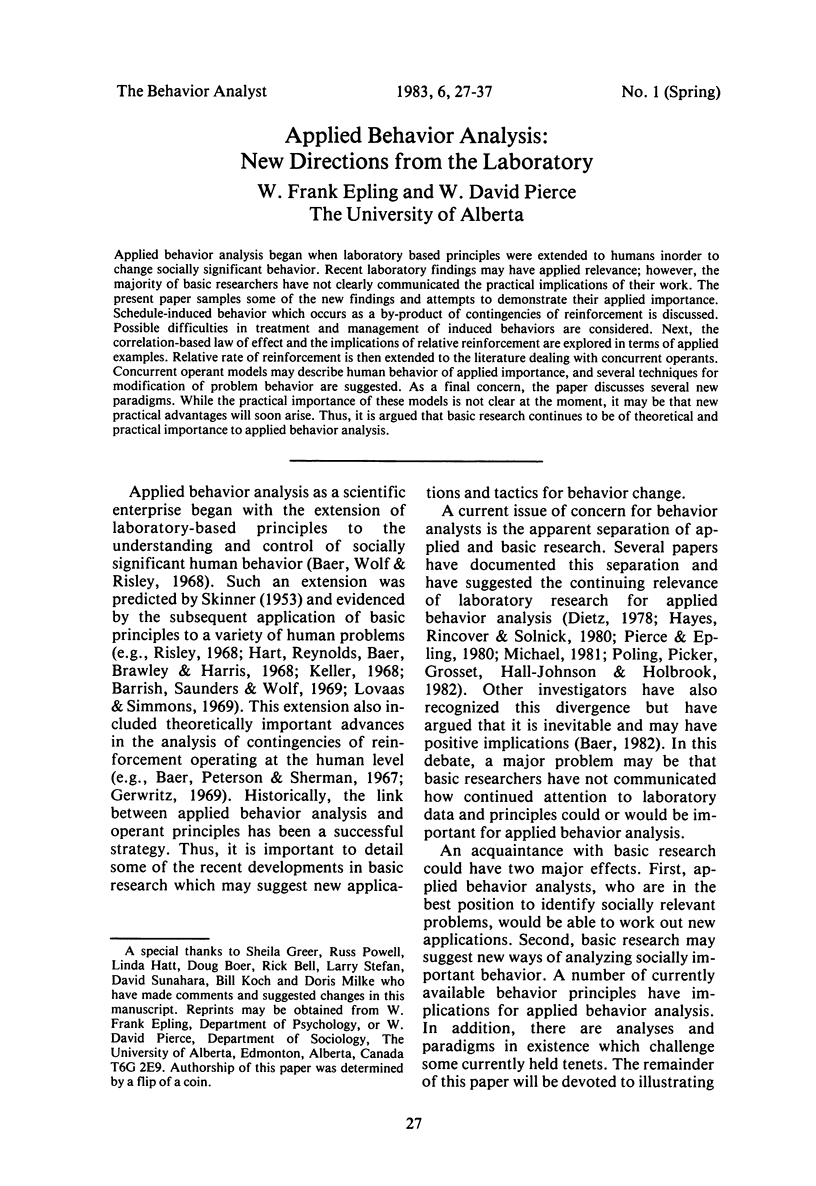
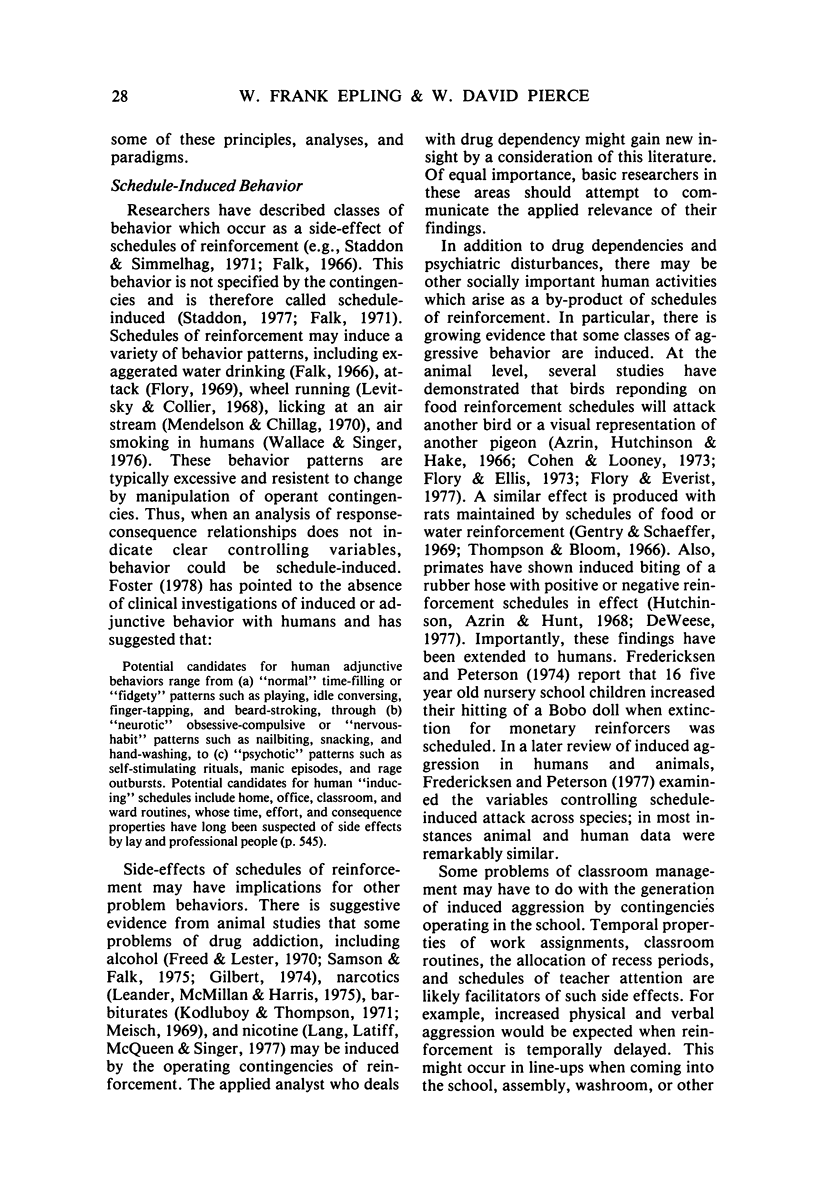
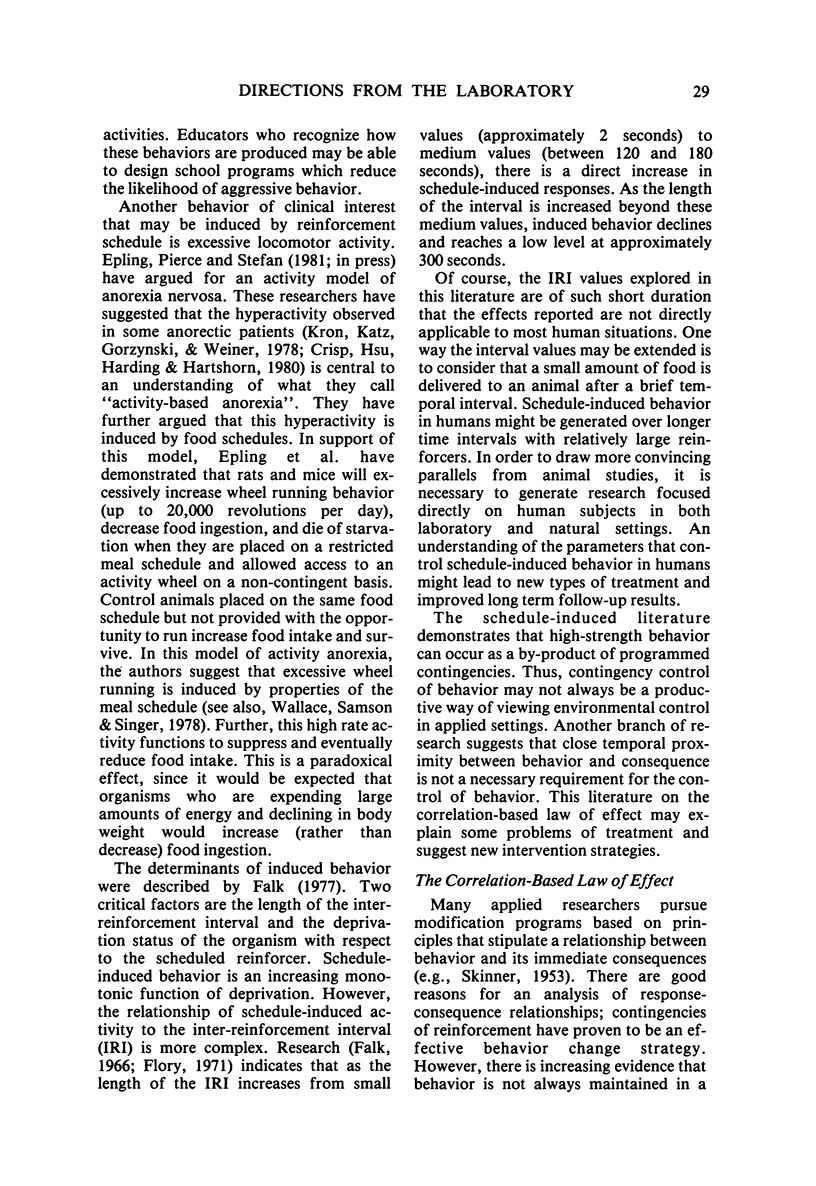
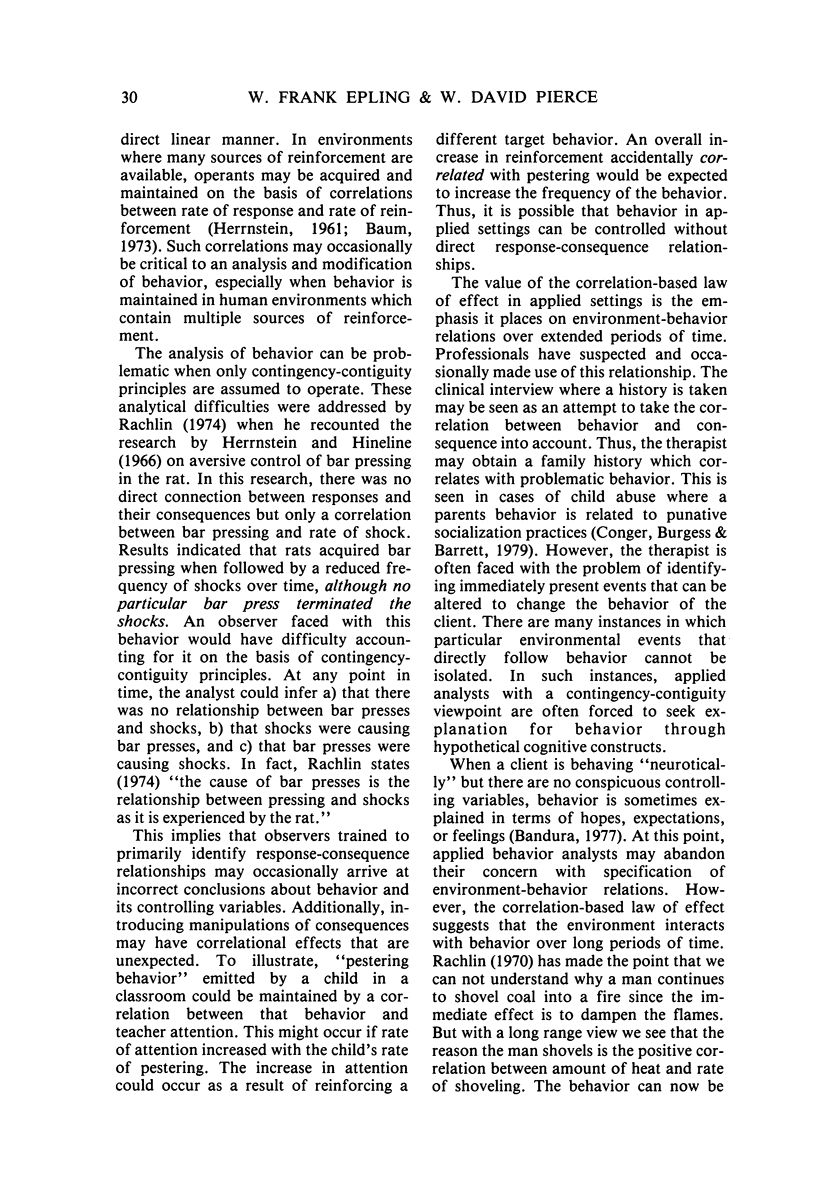
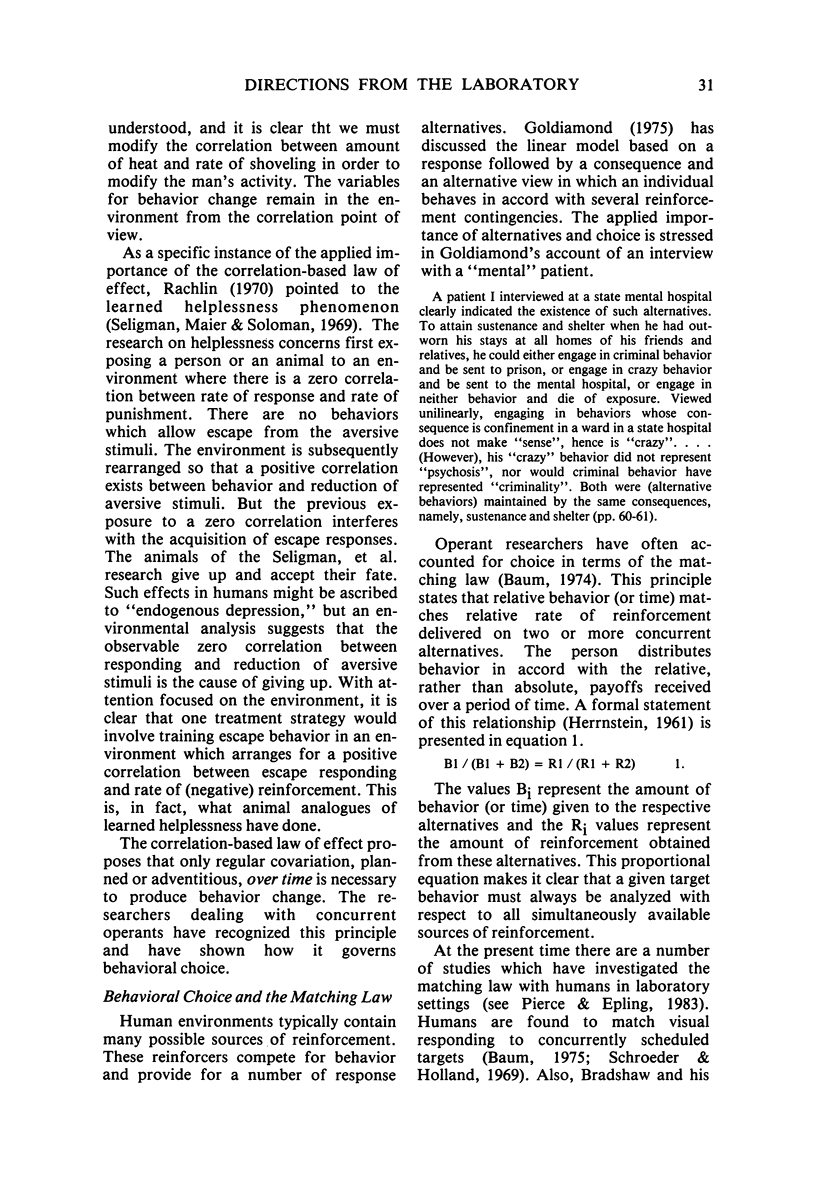
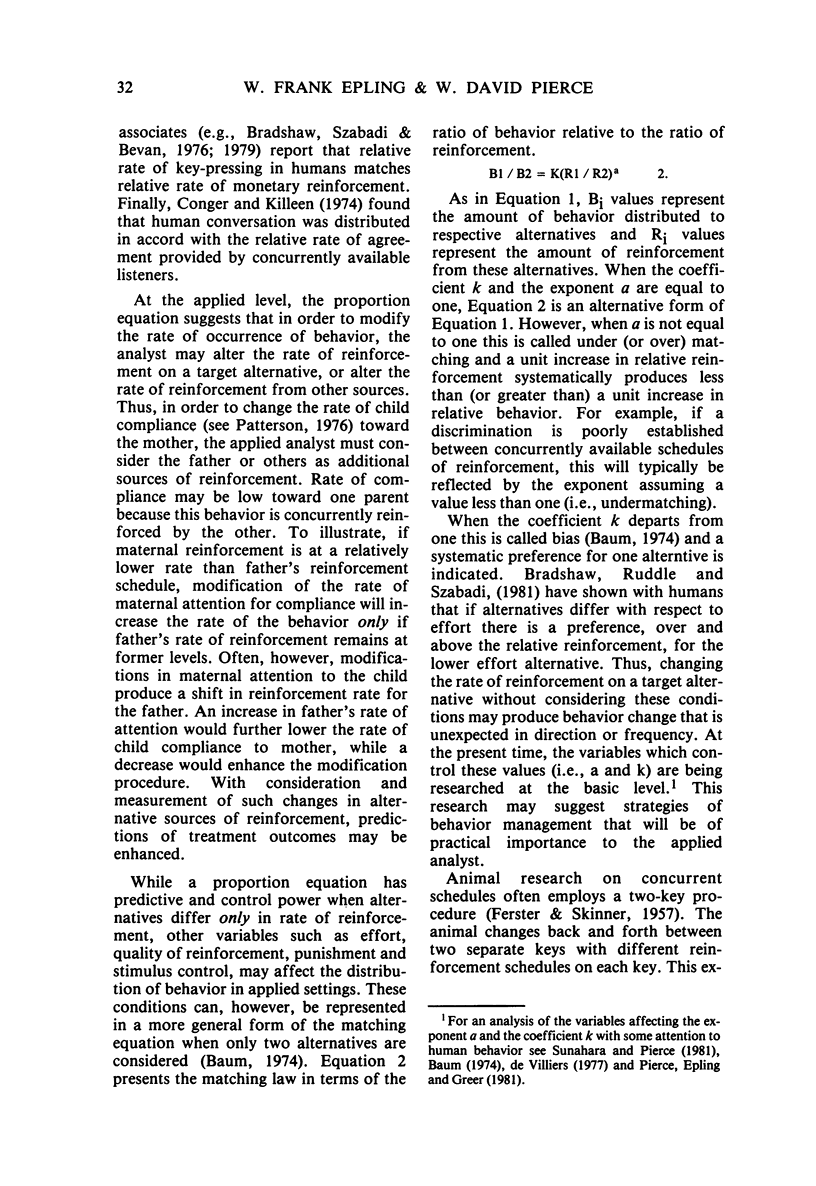
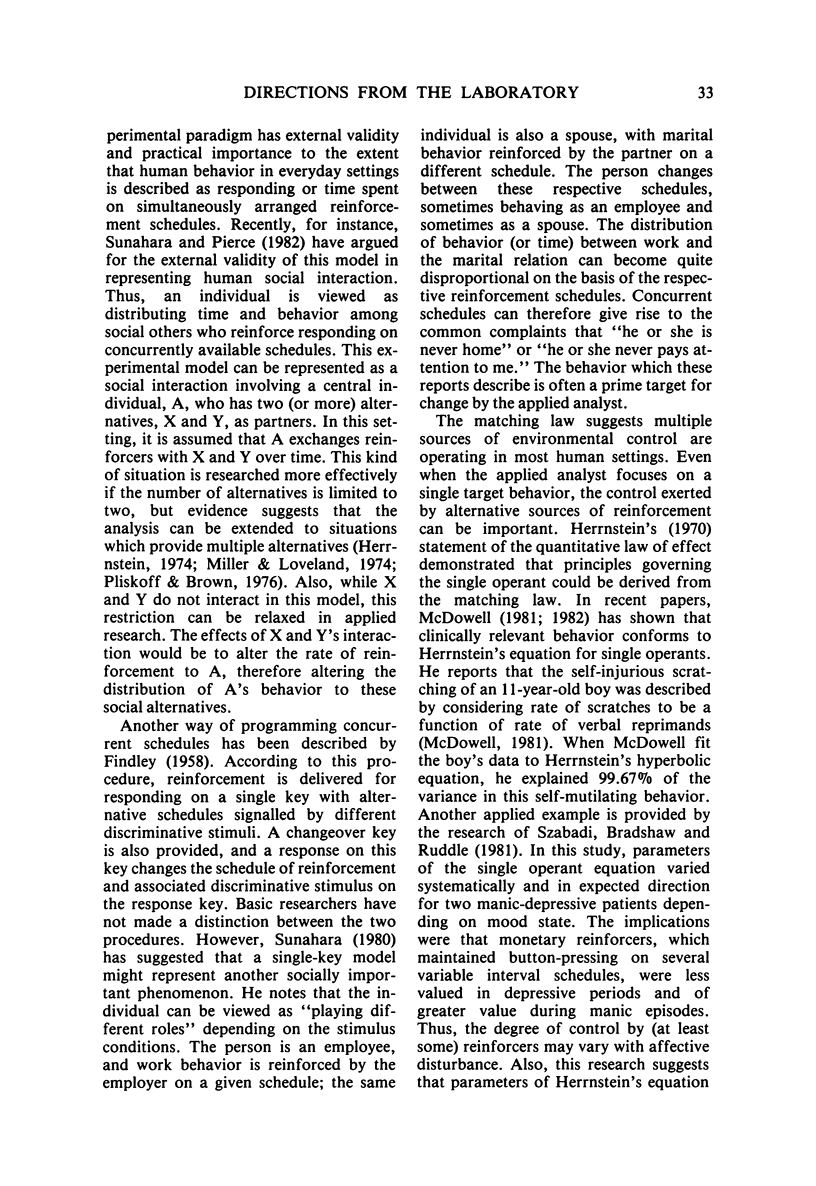
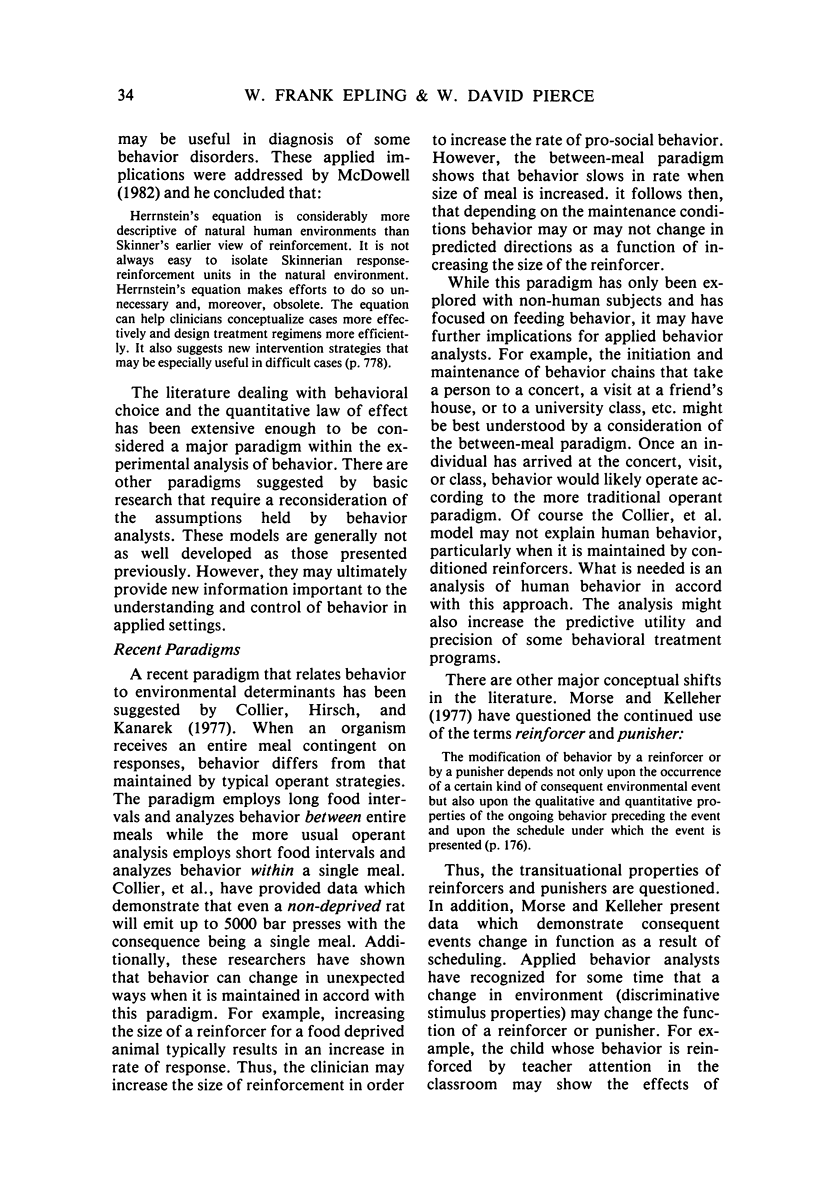
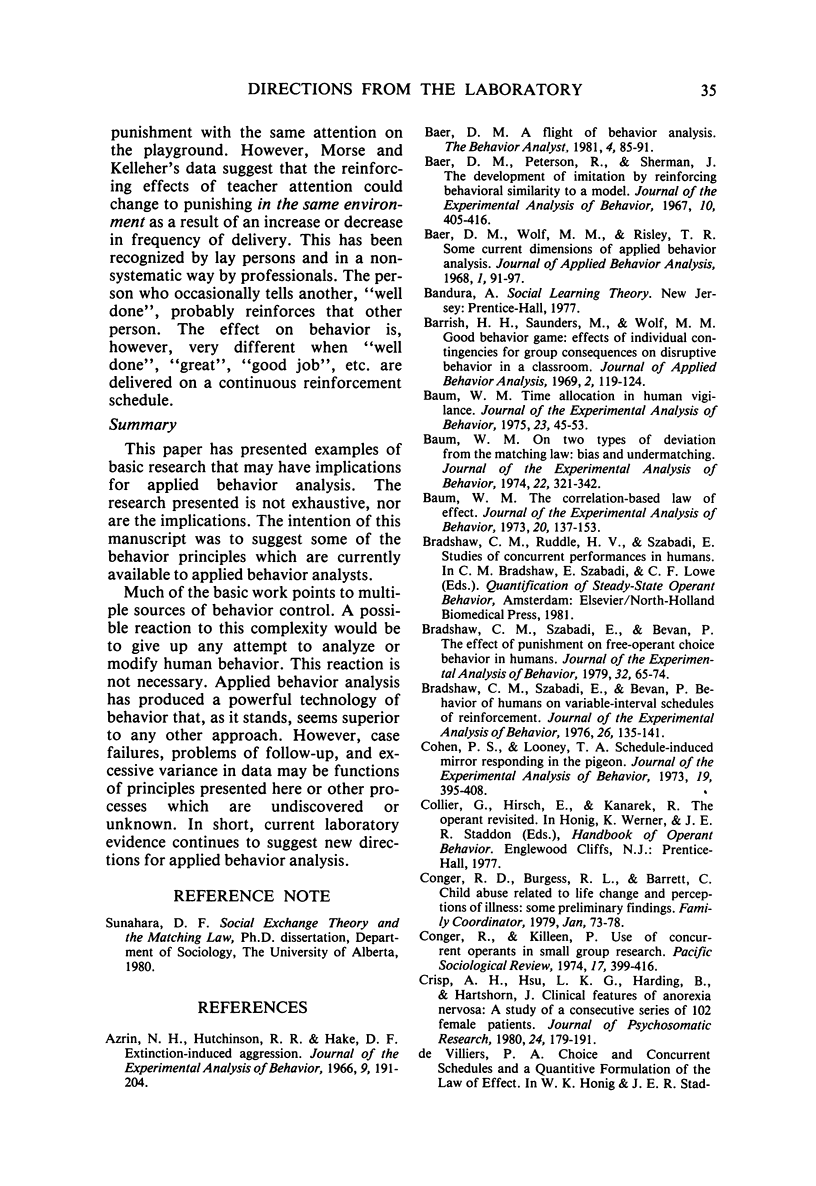
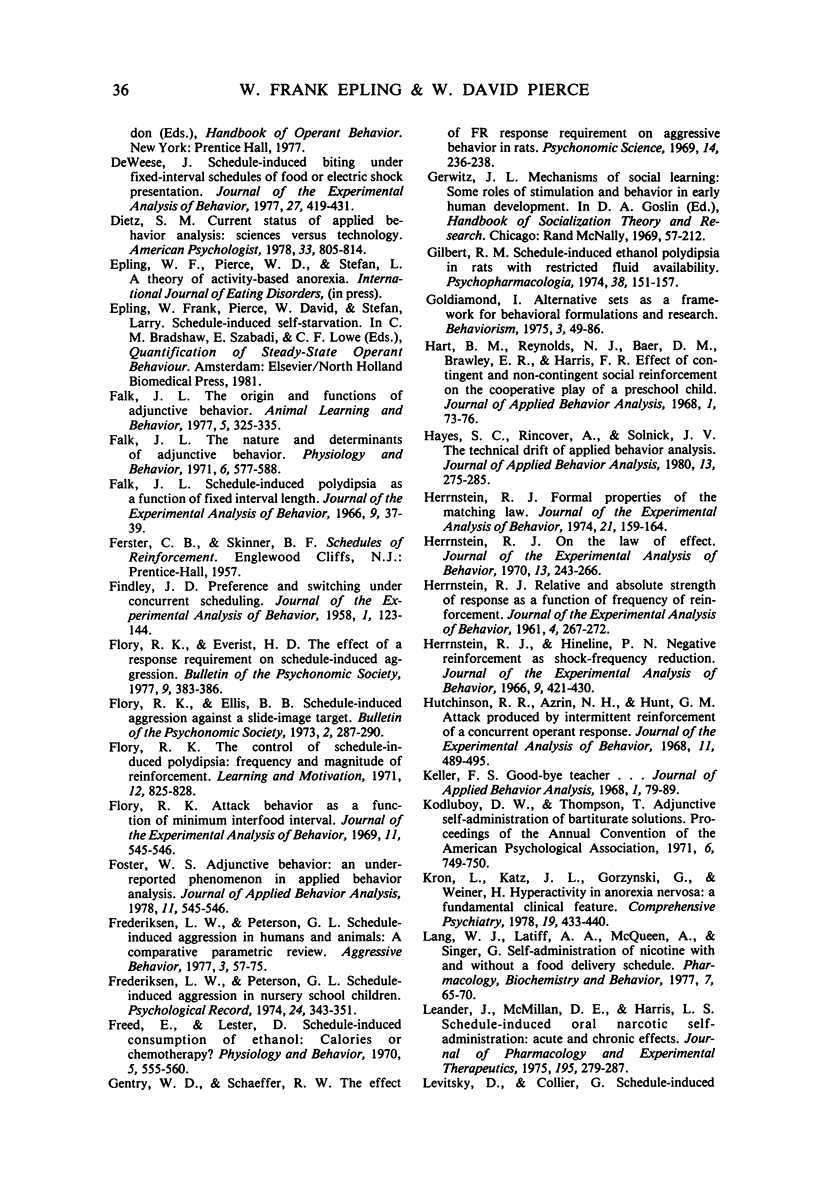
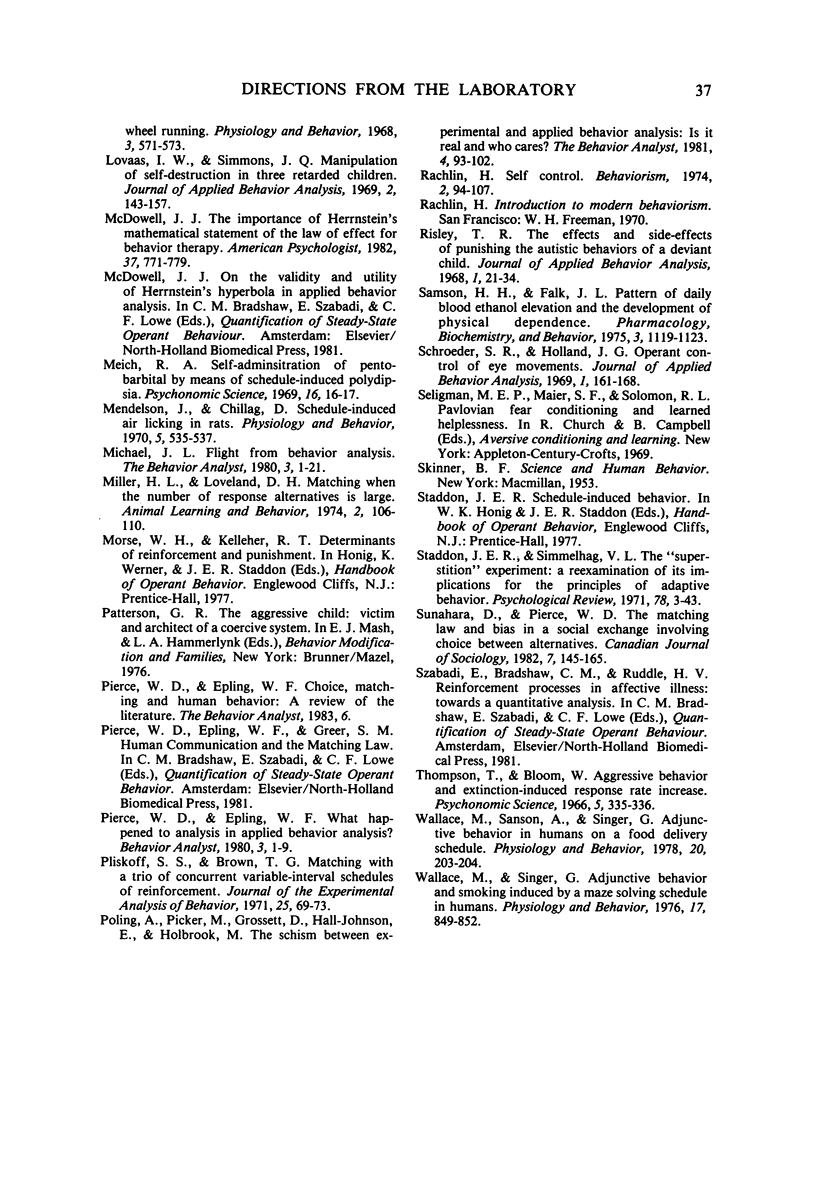
Selected References
These references are in PubMed. This may not be the complete list of references from this article.
- Azrin N. H., Hutchinson R. R., Hake D. F. Extinction-induced aggression. J Exp Anal Behav. 1966 May;9(3):191–204. doi: 10.1901/jeab.1966.9-191. [DOI] [PMC free article] [PubMed] [Google Scholar]
- Baer D. M. A flight of behavior analysis. Behav Anal. 1981 Fall;4(2):85–91. doi: 10.1007/BF03391857. [DOI] [PMC free article] [PubMed] [Google Scholar]
- Baer D. M., Peterson R. F., Sherman J. A. The development of imitation by reinforcing behavioral similarity to a model. J Exp Anal Behav. 1967 Sep;10(5):405–416. doi: 10.1901/jeab.1967.10-405. [DOI] [PMC free article] [PubMed] [Google Scholar]
- Baer D. M., Wolf M. M., Risley T. R. Some current dimensions of applied behavior analysis. J Appl Behav Anal. 1968 Spring;1(1):91–97. doi: 10.1901/jaba.1968.1-91. [DOI] [PMC free article] [PubMed] [Google Scholar]
- Baum W. M. The correlation-based law of effect. J Exp Anal Behav. 1973 Jul;20(1):137–153. doi: 10.1901/jeab.1973.20-137. [DOI] [PMC free article] [PubMed] [Google Scholar]
- Baum W. M. Time allocation in human vigilance. J Exp Anal Behav. 1975 Jan;23(1):45–53. doi: 10.1901/jeab.1975.23-45. [DOI] [PMC free article] [PubMed] [Google Scholar]
- Bradshaw C. M., Szabadi E., Bevan P. Behavior of humans in variable-interval schedules of reinforcement. J Exp Anal Behav. 1976 Sep;26(2):135–141. doi: 10.1901/jeab.1976.26-135. [DOI] [PMC free article] [PubMed] [Google Scholar]
- Cohen P. S., Looney T. A. Schedule-induced mirror responding in the pigeon. J Exp Anal Behav. 1973 May;19(3):395–408. doi: 10.1901/jeab.1973.19-395. [DOI] [PMC free article] [PubMed] [Google Scholar]
- Crisp A. H., Hsu L. K., Harding B., Hartshorn J. Clinical features of anorexia nervosa. A study of a consecutive series of 102 female patients. J Psychosom Res. 1980;24(3-4):179–191. doi: 10.1016/0022-3999(80)90040-9. [DOI] [PubMed] [Google Scholar]
- Deweese J. Schedule-induced biting under fixed-interval schedules of food or electric-shock presentation. J Exp Anal Behav. 1977 May;27(3):419–431. doi: 10.1901/jeab.1977.27-419. [DOI] [PMC free article] [PubMed] [Google Scholar]
- Falk J. L. Schedule-induced polydipsia as a function of fixed interval length. J Exp Anal Behav. 1966 Jan;9(1):37–39. doi: 10.1901/jeab.1966.9-37. [DOI] [PMC free article] [PubMed] [Google Scholar]
- Falk J. L. The nature and determinants of adjunctive behavior. Physiol Behav. 1971 May;6(5):577–588. doi: 10.1016/0031-9384(71)90209-5. [DOI] [PubMed] [Google Scholar]
- Findley J. D. Preference and Switching under Concurrent Scheduling. J Exp Anal Behav. 1958 Apr;1(2):123–144. doi: 10.1901/jeab.1958.1-123. [DOI] [PMC free article] [PubMed] [Google Scholar]
- Foster W. S. Adjunctive behavior: an under-reported phenomenon in applied behavior analysis? J Appl Behav Anal. 1978 Winter;11(4):545–546. doi: 10.1901/jaba.1978.11-545. [DOI] [PMC free article] [PubMed] [Google Scholar]
- Freed E. X., Lester D. Schedule-induced consumption of ethanol: calories or chemotherapy? Physiol Behav. 1970 May;5(5):555–560. doi: 10.1016/0031-9384(70)90080-6. [DOI] [PubMed] [Google Scholar]
- Gilbert R. M. Schedule-induced ethanol polydipsia in rats with restricted fluid availability. Psychopharmacologia. 1974;38(2):151–157. doi: 10.1007/BF00426109. [DOI] [PubMed] [Google Scholar]
- HERRNSTEIN R. J. Relative and absolute strength of response as a function of frequency of reinforcement. J Exp Anal Behav. 1961 Jul;4:267–272. doi: 10.1901/jeab.1961.4-267. [DOI] [PMC free article] [PubMed] [Google Scholar]
- Hart B. M., Reynolds N. J., Baer D. M., Brawley E. R., Harris F. R. Effect of contingent and non-contingent social reinforcement on the cooperative play of a preschool child. J Appl Behav Anal. 1968 Spring;1(1):73–76. doi: 10.1901/jaba.1968.1-73. [DOI] [PMC free article] [PubMed] [Google Scholar]
- Hayes S. C., Rincover A., Solnick J. V. The technical drift of applied behavior analysis. J Appl Behav Anal. 1980 Summer;13(2):275–285. doi: 10.1901/jaba.1980.13-275. [DOI] [PMC free article] [PubMed] [Google Scholar]
- Herrnstein R. J. Formal properties of the matching law. J Exp Anal Behav. 1974 Jan;21(1):159–164. doi: 10.1901/jeab.1974.21-159. [DOI] [PMC free article] [PubMed] [Google Scholar]
- Herrnstein R. J., Hineline P. N. Negative reinforcement as shock-frequency reduction. J Exp Anal Behav. 1966 Jul;9(4):421–430. doi: 10.1901/jeab.1966.9-421. [DOI] [PMC free article] [PubMed] [Google Scholar]
- Herrnstein R. J. On the law of effect. J Exp Anal Behav. 1970 Mar;13(2):243–266. doi: 10.1901/jeab.1970.13-243. [DOI] [PMC free article] [PubMed] [Google Scholar]
- Hutchinson R. R., Azrin N. H., Hunt G. M. Attack produced by intermittent reinforcement of a concurrent operant response. J Exp Anal Behav. 1968 Jul;11(4):489–495. doi: 10.1901/jeab.1968.11-489. [DOI] [PMC free article] [PubMed] [Google Scholar]
- Keller F. S. "Good-bye, teacher...". J Appl Behav Anal. 1968 Spring;1(1):79–89. doi: 10.1901/jaba.1968.1-79. [DOI] [PMC free article] [PubMed] [Google Scholar]
- Kron L., Katz J. L., Gorzynski G., Weiner H. Hyperactivity in anorexia nervosa: a fundamental clinical feature. Compr Psychiatry. 1978 Sep-Oct;19(5):433–440. doi: 10.1016/0010-440x(78)90072-x. [DOI] [PubMed] [Google Scholar]
- Lang W. J., Latiff A. A., Mcqueen A., Singer G. Self administration of nicotine with and without a food delivery schedule. Pharmacol Biochem Behav. 1977 Jul;7(1):65–70. doi: 10.1016/0091-3057(77)90012-0. [DOI] [PubMed] [Google Scholar]
- Leander J. D., McMillan D. E., Harris L. S. Schedule-induced oral narcotic self-administration: acute and chronic effects. J Pharmacol Exp Ther. 1975 Nov;195(2):279–287. [PubMed] [Google Scholar]
- McDowell J. J. The importance of Herrnstein's mathematical statement of the law of effect for behavior therapy. Am Psychol. 1982 Jul;37(7):771–779. doi: 10.1037//0003-066x.37.7.771. [DOI] [PubMed] [Google Scholar]
- Mendelson J., Chillag D. Schedule-induced air licking in rats. Physiol Behav. 1970 Apr;5(4):535–537. doi: 10.1016/0031-9384(70)90263-5. [DOI] [PubMed] [Google Scholar]
- Michael J. Flight from behavior analysis. Behav Anal. 1980 Fall;3(2):1–21. doi: 10.1007/BF03391838. [DOI] [PMC free article] [PubMed] [Google Scholar]
- Pliskoff S. S., Brown T. G. Matching with a trio of concurrent variable-interval schedules of reinforcement. J Exp Anal Behav. 1976 Jan;25(1):69–73. doi: 10.1901/jeab.1976.25-69. [DOI] [PMC free article] [PubMed] [Google Scholar]
- Poling A., Picker M., Grossett D., Hall-Johnson E., Holbrook M. The schism between experimental and applied behavior analysis: Is it real and who cares? Behav Anal. 1981 Fall;4(2):93–102. doi: 10.1007/BF03391858. [DOI] [PMC free article] [PubMed] [Google Scholar]
- Risley T. R. The effects and side effects of punishing the autistic behaviors of a deviant child. J Appl Behav Anal. 1968 Spring;1(1):21–34. doi: 10.1901/jaba.1968.1-21. [DOI] [PMC free article] [PubMed] [Google Scholar]
- Samson H., Falk J. L. Pattern of daily blood ethanol elevation and the development of physical dependence. Pharmacol Biochem Behav. 1975 Nov-Dec;3(6):1119–1123. doi: 10.1016/0091-3057(75)90026-x. [DOI] [PubMed] [Google Scholar]
- Wallace M., Sanson A., Singer G. Adjunctive behavior in humans on a food delivery schedule. Physiol Behav. 1978 Feb;20(2):203–204. doi: 10.1016/0031-9384(78)90075-6. [DOI] [PubMed] [Google Scholar]
- Wallace M., Singer G. Adjunctive behavior and smoking induced by a maze solving schedule in humans. Physiol Behav. 1976 Nov;17(5):849–852. doi: 10.1016/0031-9384(76)90052-4. [DOI] [PubMed] [Google Scholar]


